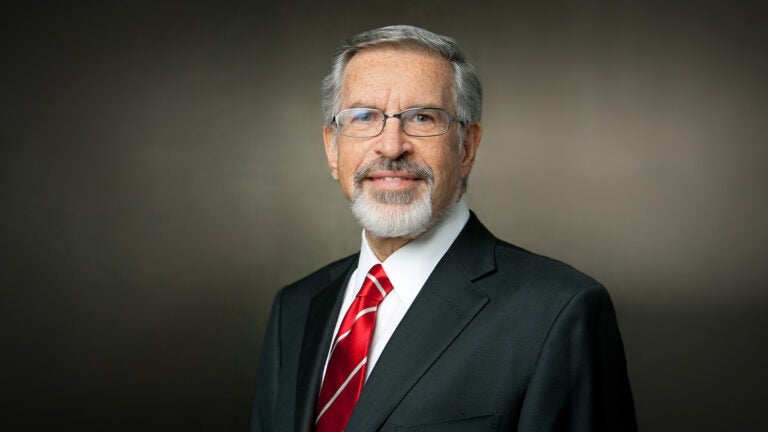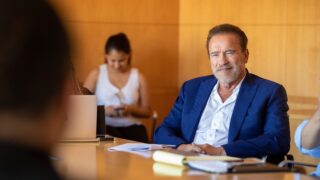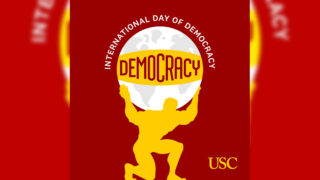Leonard D. Schaeffer
University
Longtime donor gift establishes the new Center for Civic Society at the USC Schaeffer Institute for Public Policy & Government Service
Gift by USC Trustee Leonard D. Schaeffer creates center to bolster democracy and strengthen civic trust at home and abroad.
USC Interim President Beong-Soo Kim on Monday morning announced a generous gift from philanthropist Leonard D. Schaeffer that aims to strengthen democracy and civic norms nationwide and across the globe. The gift will establish the new Center for Civic Society within the USC Schaeffer Institute for Public Policy & Government Service.
“Healthy democracies depend on engaged citizens and effective institutions,” said Leonard Schaeffer, USC trustee and Schaeffer Center Advisory Board chair. “The Center for Civic Society at the USC Schaeffer Institute will conduct rigorous research that provides evidence and insight to meaningfully address our most urgent civic challenges. This research and the resulting policy recommendations will help us find common ground and new ways to foster a sense of shared purpose across communities.”
Kim also announced the appointment of the Right Honourable Gordon Brown, former prime minister of the United Kingdom, as Distinguished Scholar at the USC Schaeffer Institute, which includes the Steel Chair established through a gift from the late USC Professor Emeritus Ronald Steel, an internationally recognized voice on U.S. foreign policy. Brown will lead the new center and teach courses at the USC Dornsife College of Letters, Arts and Sciences. Brown will accept no personal remuneration for his work. All resources will go toward research by bringing in additional academic expertise to the center.
Over more than three decades of public service in the United Kingdom, Brown’s leadership resulted in significant policy achievements, including major reform of Britain’s monetary and fiscal policy, and sustained investment in health and education. Since leaving office, he has continued his leadership, driven by a deep commitment to bolstering global democratic norms and improving social well-being.
“At a time when many democracies are being pulled apart by the politics of division, this center will stand for something different: the rigorous pursuit of understanding,” Brown said. “Our research will not only expose the roots of polarization but help illuminate the path to renewed civic trust. Universities have always been places of inquiry, but today they must also be engines of empathy, bringing evidence, reason and humanity back into the heart of public discourse.”
Kim — whose commitment to strengthening democracy and promoting civil discourse is a top priority — made the announcement on the International Day of Democracy, a holiday created by the United Nations to promote and uphold the principles of democracy.
“As political divides deepen across the country, USC continues to be a place where scholars with differing perspectives can come together for real-world solutions to some of society’s most stubborn problems,” Kim said. “Through this new center, USC will continue its legacy of informing the leaders of tomorrow and producing engaged, civic-minded scholars.”
An enduring partnership
Schaeffer — a USC trustee since 2013 and chair of the USC Health System Board — has partnered with the university for more than 15 years in his lifelong commitment to finding actionable solutions for society’s most pressing issues. In 2009, Schaeffer and his wife, Pamela, donated a gift to the university to establish the USC Schaeffer Center for Health Policy & Economics as a collaboration between the USC Alfred E. Mann School of Pharmacy and Pharmaceutical Sciences and the USC Price School of Public Policy. It remains one of the nation’s leading resources for health economic scholarship and policy advice.
In 2014, Schaeffer also established the Leonard D. Schaeffer Fellows in Government Service, a program that educates 50 undergraduate students a year through paid internships. In 2024, Schaeffer bolstered these longstanding programs by founding the USC Leonard D. Schaeffer Institute for Public Policy and Government Service to serve as a policy laboratory to develop and test ideas generated by the USC academic community and provide a forum to reach federal policymakers. The institute recently opened a new office at USC’s Capital Campus in Washington, D.C., in addition to its University Park Campus home.
The throughline across these programs — which spurred the creation of the new Center for Civic Society — is an enduring desire to support nonpartisan, evidence-based research that translates into better public policy and productive dialogue.
Honoring a public intellectual who elevated foreign policy discourse
The late Ronald Steel, for whom the new chair is named, was a beloved professor of international relations at USC. Through hundreds of essays and seven seminal books, Steel shaped the way foreign policy issues were understood by broad audiences. Steel’s legacy of public intellectual engagement aligns seamlessly with the new center’s mission to bridge academic research on global social issues with public understanding.
“Ronald Steel was a rigorous intellectual who elevated the public debate on complex global issues. He was fully engaged in the academic goals of USC for more than 20 years.” said Susan Sherwin, a friend of Steel’s and trustee of his estate. “We hope that Gordon Brown’s policy achievements and leadership on the international stage will fulfill Ron’s legacy of bringing critical scholarship to the public square.”
Fostering open dialogue through innovative research
At its core, the Center for Civic Society is designed to foster open dialogue and discourse. Under Brown’s leadership, and in partnership with established Schaeffer Institute scholars, the center will seek to bridge divides across political, social and ideological differences. Topics of inquiry will include using behavioral science to understand and influence public opinion; exploring strategies to increase civic participation, voter turnout and public trust; and identifying the impact of artificial intelligence on democratic processes.
“The Center for Civic Society represents exactly the kind of work USC and the Schaeffer Institute are built for: addressing complex societal challenges with rigorous analysis and actionable solutions,” said Dana Goldman, founding director of the USC Schaeffer Institute. “Under Gordon Brown’s leadership, this center will build on our commitment to dig into the data, translate the evidence and develop tools that policymakers can actually use.”
Center scholars will also develop a Schaeffer Civic Engagement Index to examine how issues such as loneliness, social network size and social network diversity have influenced political polarization and fragmentation across the nation. A proposed Schaeffer Standard of Living Index will help policymakers better understand how measures of inequality such as inflation, unemployment and changes in welfare programs affect people’s lives.
Training the leaders of tomorrow
With the opening of the new Center for Civic Society in 2026, the USC Schaeffer Institute will continue its legacy of established credibility across political divides and training the next generation of world leaders dedicated to using Schaeffer’s evidence-based approach to public service and public policy to improve lives.
During his remarks at the opening celebration of the USC Schaeffer Institute in 2024, Schaeffer stressed that it was critical that USC continue “to produce research to support evidence-based policymaking and to educate students to be responsible and involved citizens of a true, functioning democracy.”
As democracies worldwide continue to face a growing loss of faith in science and government, the center’s — and Schaeffer’s — mission to engage public and private sector leaders in productive, nonpartisan dialogue is as timely as ever.



